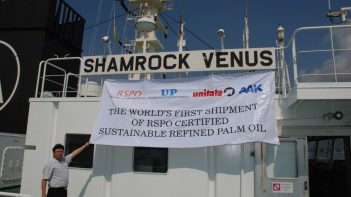Palm oil or palm oil derivatives certified by the Roundtable on Sustainable Palm Oil (RSPO) can be sourced through four different supply chain models: ’Identity Preserved’, ‘Segregated’, ‘Mass Balance’ and ‘Book and Claim’.
Each of these models comes with its own advantages, requirements and pre-approved consumer claim. The four models play different but equally important roles towards achieving the RSPO vision of “transforming the market to make Certified Sustainable Palm Oil the norm”. Companies that would like to take their responsibility in sustainable sourcing, are advised to start today with sourcing through one of these models.
Each model ensures that market claims about the production and use of sustainable palm oil remain transparent and accurate. In mature markets and where there is availability of physical supply, more and more industries now move from ‘Book and Claim’ to physical supply chain models. While the RSPO focuses on promoting physical supply of Certified Sustainable Palm Oil via Identity Preserved, Segregated and Mass Balance in mature markets, it acknowledges the continuous importance of the Book & Claim model to ensure market inclusivity. Growers may not be directly linked to a market demand for sustainable palm oil, and market players may not be able to source physical certified products yet. Book and Claim also represent an excellent tool to cover CSPO sourcing in the case of products and derivatives which are not available through any of the physical supply chain models.
Following is a brief overview of the four supply chain systems; more detailed information is available on https://rspo.org/as-an-organisation/certification/supply-chains/.
IDENTITY PRESERVED
Sustainable palm oil from a single identifiable certified source is kept separate from ordinary palm oil throughout supply chain. This supply chain allows users to trace the palm oil back to the mill of origin, allowing users to claim that their product contains Certified Sustainable Palm Oil (please refer to the RSPO rules on market communications and claims)
ADVANTAGES
- Traceability back to mill of origin
- Highest level of claims
SEGREGATED
Sustainable palm oil from different certified sources is kept separate from ordinary palm oil throughout supply chain. This supply chain ensures that segregated palm oil is only sourced from certified mills, allowing users to claim that their product contains Certified Sustainable Palm Oil (please refer to RSPO rules on market communications and claims)
ADVANTAGES
- Highest level of claims
- Certified supply chain
- Reduced costs compared with IP as sustainable material from one mill may be mixed with sustainable material from another mill
MASS BALANCE
Sustainable palm oil from certified sources is mixed with ordinary palm oil throughout supply chain. The mixing can happen at any stage (e.g. mill, refinery, fractionation plant etc) of the supply chain. Users are allowed to claim that their product contributes to the production of Certified Sustainable Palm Oil (please refer to RSPO rules on market communications and claims)
ADVANTAGES
- Availability of certified derivatives
- More suitable for commodity trade as it reduces the additional costs for keeping material separated
- Certified supply chain
BOOK & CLAIM
The chain is not monitored for the presence of sustainable palm oil. Manufacturers and retailers can buy a Book & Claim certificate from a RSPO-certified grower or miller. Users are allowed to claim that their product contributes to the production of Certified Sustainable Palm Oil (please refer to RSPO rules on market communications and claims)
ADVANTAGES
- Overcomes issues of physical supply chains for complex fractions, derivatives
- Incentive for independent smallholders who don’t export to sustainable demand markets to gain RSPO certification
- Links buyers and sellers independently of their location, also in cases where a and blends connection to the physical supply chain is unavailable.
Keep reading
Call for Proposal: Study on Wild Palms in West and Central Africa

RSPO hosts first Africa downstream sustainable palm oil supply chain forum in Cape Town

Nearly two decades on, Europe continues to drive global demand for RSPO Certified Palm Oil

Communicating Sustainable Palm Oil - examples of success across Europe
[EOT] Terms of Reference: Independent Smallholders Outreach Programme in Indonesia

RT2023 Delegates Propose Solutions to Reinforce RSPO’s Assurance System – End-Year Highlights of Assurance Standing Committee
RSPO UK Members' Day Examines Shifting Dynamics of Doing Business within Europe

Celebrating 20 Years of RSPO’s Sustainability Journey




